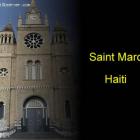The City of Port-de-Paix, Haiti
ADVERTISEMENT
A rich agricultural area, it grows coffee, bananas, tobacco, rice, and cacao. Because the city is so accessible to the U.S. via the Atlantic, a flourishing smuggling trade has developed in Port-de-Paix since the 1990s.
The city was initially discovered in 1492 by Christopher Columbus, who called it Valparaiso. The French, who had settled Saint-Domingue during the 1600s, made Port-de-Paix its capital after they had been ousted from Tortuga Island by the British. In 1679 Port-de-Paix witnessed the initial black slave uprising, which was to last a decade. By the 19th century, Port-de-Paix was prospering. However, in 1902 a fire broke out and raged through the city, completely demolishing it. Since that time, it has never made a full recovery.
Port-de-Paix's air transportation infrastructure is well developed, being served by many regional airlines. They offer flight service from Port-de-Paix Airport to Toussaint Louverture International Airport, located in Port-au-Prince, and to Cap-Haitien International Airport in Cap-Haitien. A ferry operation carries tourists between the beautiful beaches of Port-de-Paix and Tortuga Island.
In Port-de-Paix, radio stations abound, many of them FM, and a few broadcast over the Internet. Fans of Compás in Port-de-Paix favor such music artists as Shoubou de Tabou Combo, Cubano de Skah Shah, and Drumcp.
Read more: Port-de-Paix, Haiti
« Passé Reine Part of Haiti's Biggest Department, Artibonite | Main | Perodin, Haiti »
Leave a Reply
Name (required) E-mail (required, will not be published)
» »
Our objective is to share with you news and information about Haiti and the people of Haiti. Traditions, habits and the way we were or grew are alive in this site. We highly recommend that you Subscribe to our Newsletter and also share with us some of the things that are memorable and made us unique people.


 Life After Death
Life After Death  Informative Marketing and Advertising in the Haitian Community
Informative Marketing and Advertising in the Haitian Community  La Chapelle, Haiti
La Chapelle, Haiti  Something to think about
Something to think about  Saint Marc, Haiti
Saint Marc, Haiti